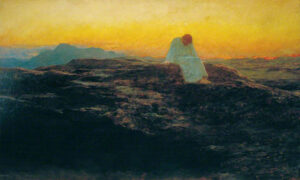In our world we want to know things. We want Google at our fingertips to tell us everything about anything, and we want Facebook to instantly tell us everything else.
As Christians, we are no different in our quest for answers about our relationship with God. We want to know specifics about God, and our relationship with him. Moreover, we want to know why we are here, what is the meaning of life, where is God.
In the story of the transfiguration of our Lord, which I like to refer to as a mountaintop experience, I ask the question, can we be transfigured on a mountaintop, or do life-changing moments of mystery and wonder not happen today?
Life is full of mountain experiences. They are the times when we find healing, or unexpected love, when we suddenly have an ‘aha’ moment and clearly know the answer to a problem or an important life decision.
It’s tempting to want our life’s journey to be made up of only mountaintop experiences. Then we might bypass the chaos, challenges and struggles. In our mountaintop moments, something inside us cries out, “it is good for us to be here. Let’s just bask in the glory of this place.”
It is also true that life, especially if one is a Christian, continually calls us down from those moments, down from the mountaintop, and out into the world.
To follow the teachings of Jesus is not easy. Coming into God’s presence is like entering a thick cloud where definition is not always precise, but it is there where answers may not seem logical; but they are there and in that cloudy presence, that mountaintop experience we are transfigured, changed for the better, and enlightened for a time.
Our encounter with God in mountaintop moments changes our lives. Changes how we look at the world by making us more aware of how we are to live and what God is calling us to do in the world. It is in these mountaintop experiences that we learn the most and are often brought to tears in most cases and we don’t totally understand ourselves.
Encountering God, whether on the mountaintop or at your dining table, leaves you with a sense of awe and joy, often something that you can’t explain, but you know you have been changed. That you have a feeling of being surrounded with love and joy.
We try to move too fast in the world today. We want what we want, when we want it. We want it handed to us on a silver platter, all wrapped up in an explanation. We want no uncertainty; no fogginess; nothing that we have to think about.
Our task, our challenge, is to stay open to experiencing the mountaintops, to hearing the voice, to receiving the answers, to follow the directions. In the Gospel reading for this Sunday, we are told that Moses and Elijah were speaking to Jesus about “his departure”, which he was about to accomplish in Jerusalem. We are meant to understand that the distance between the mountaintop and the cross is not so great, and that Jesus’ followers should never lose sight of either one of them. In our mountaintop moments we must recognize the sacrifices that we are called to make, just as Jesus did. In our lowly moments of despair, we are to remember God’s sovereignty reigns over all things, that indeed “all will be well” despite the struggles of the world we are living in.
In the end, the test of any mountaintop experience is what happens back at ground level, where the Holy Spirit moves. Whatever mountaintop experiences we have individually, or as a member of the Body of Christ, what we do with these experiences here on earth in our daily lives is what matters. Our transfigurations must change us for the better in the way we live and work. It must enlighten and sustain us and motivate us to follow Jesus in every aspect of our lives.
We must stay open through prayer and meditation, willing to walk into the cloudy mist and seek the Presence of God and then go forward to work for the transfiguration of the world with joy and love.


Title: Temptation in the Wilderness; Date: 1898; Artist: Briton Rivière (1840-1920); Building: Guildhall Art Gallery; Object/Function: Painting; City/Town: London; Country: United Kingdom; Scripture: Luke 4:1-13. Permalink: https://diglib.library.vanderbilt.edu/act-imagelink.pl?RC=56821. (Use this link to refer back to this image.)


